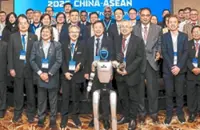The company cited literature which it said indicates that chatting with AI as one might with a person can result in misplaced trust and that the high quality of the GPT-4o voice may exacerbate that effect. — AFP
OpenAI says it is concerned that a realistic voice feature for its artificial intelligence might cause people to bond with the bot at the cost of human interactions.
The San Francisco-based company cited literature which it said indicates that chatting with AI as one might with a person can result in misplaced trust and that the high quality of the GPT-4o voice may exacerbate that effect.





